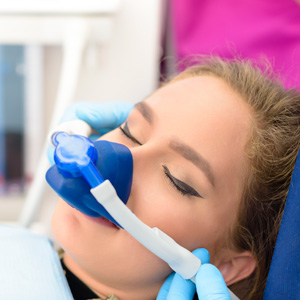Sedation Dentistry in Gungahlin
What is Dental Sedation?

Sedative medications assist you in feeling comfortable and sleepy, allowing your dental professional to begin the necessary procedures. The medications available range from anxiolytics to tranquilizers and have a number of ways they can be administered.
If you have felt nervous or anxious about visiting the dentist in the past, you’re not alone. At Shine Dentists, Gungahlin, we offer 2 types of sedation options: local anaesthetic and inhalation sedation (happy gas) so that you can feel relaxed at your appointments.
- Inhalation sedation. Commonly known as nitrous oxide or happy gas, in just five minutes you’ll remember little of what is done and may fall asleep. It’s administered incrementally until the desired affect is achieved.
- Local anaesthetic. Nerve impulses to the site of the procedure are blocked with a gel or spray, numbing the area before the local anaesthetic is injected. You’re fully conscious but won’t feel the treatment.
We also have the ability to refer to specialists for many other types of sedation such as: Oral conscious sedation, Intravenous (IV) sedation or General anaesthetic.
Get Started Today
If you’d like to find out more about completing your dental care comfortably, contact us today! We offer same-day appointments.
*Any surgical or invasive procedure carries risks. Before proceeding, you should seek a second opinion from an appropriately qualified health practitioner.*
